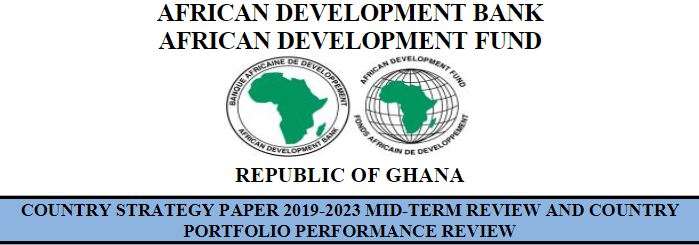The African Development Bank has disclosed that its 2019-2023 Country Strategy for Ghana is producing tangible results, particularly in the agriculture and transport sectors based on a mid-term review of the strategy.
The strategy, which was approved by the Board of Executive Directors of the African Development Bank Group in June 2019, is based on two pillars: support for Ghana’s industrialization and private-sector development activities, and support for infrastructure development that enables domestic, regional and global trade.
AfDB disclosed in the mid-term review of the Country Strategy Paper that its various operations in the agriculture sector have helped to improve productivity, expand output, leverage private investment and de-risk agricultural lending.
“The Bank’s Technologies for Accelerated Agricultural Transformation (TAAT) interventions are improving the productivity of selected commodities and expanding production areas, especially in the Northern Savannah agro-ecological zone. These interventions increased maize yields by 132% and soybean yields by 25% in 2020.
“Moreover, under the Ghana Incentive-based Risk Sharing System for Agricultural Lending, 15 financial institutions have granted $31 million in loans and $14.5 million in credit risk guarantees, thus contributing to improvements in agricultural productivity and farmers’ incomes”.
AfDB
The Rural Enterprises Project
The Rural Enterprises Project, implemented as part of the Ghana CSP 2019-2023, is also improving the livelihoods of rural micro and small-scale entrepreneurs by improving access to business development services, according to the Bank.
The review document states that “By mid-term of the strategy, the project has created 74,677 waged jobs (75% of target), and 37 business resource centres and 30 technology solution centres across the country are supporting youth entrepreneurs and improving livelihoods for rural communities”.

In terms of transport, the Accra Urban Transport Project has been completed. Among other things, a four-tier interchange has been built to promote the efficient movement of goods and people, boost trade, enhance income generation and improve the livelihoods of users, the African Development Bank disclosed.
The Bank further indicated that in particular, the project has helped to reduce vehicle operating costs by 37%, cut travel time from two hours to 30 minutes and lower road accident rates by 40%.
The AfDB stated that the project also provided protection for the Gua Sacred Forest, which reduces CO2 emissions, and provided 14 primary schools with fully equipped, modern ICT labs. These provide access to bespoke ICT training for over 12,000 primary school children, more than 50% of whom are girls.
Per the Bank’s review, the project has also enabled two women’s groups to renovate their facilities and get ICT support to improve the quality of their businesses, increasing the annual average income of over 500 women by 10%.
The Ghana CSP 2019-2023 is being implemented over the period that overlaps the last year of ADF-14 (2017-2019), three years of ADF-15 (2020-2022) and the first year of ADF-16 (2023-2025). The total resource envelops for ADF-14 and ADF-15 are UA121 million and UA118 million, respectively.

All of ADF-14 resources, and 42% of ADF-15 resources have been committed. Sovereign financing from ADF resources was complemented by AfDB non-sovereign funding (UA 53.4million, Trust Funds (UA 11million), co-financing (UA 14.3 million) and non-lending operations.
For the remaining period of the strategy, financing will come from balance of ADF-15 resources, first year ADF-16 allocation, AfDB non-Sovereign and resources leveraged from co-financing and private sector investments.
The Bank pledged to continue to support initiatives to improve the business environment and investment in critical infrastructure such as energy and agriculture in order to lay foundation for the development of a competitive industry.
READ ALSO: The Ghanaian Cedi to Weaken Further From Record Low- Bloomberg Predicts






















